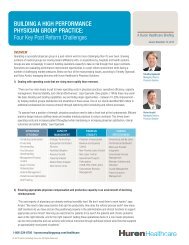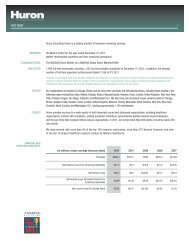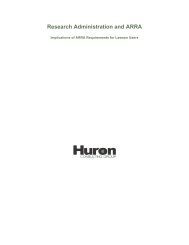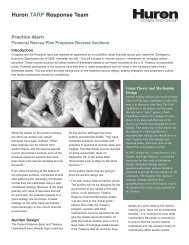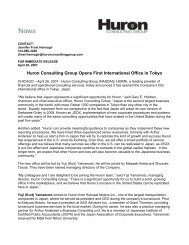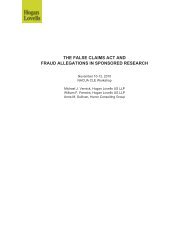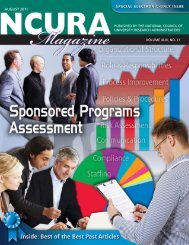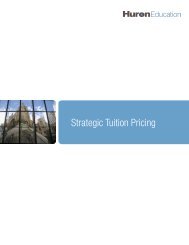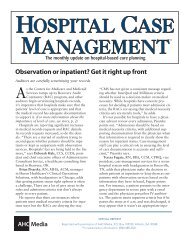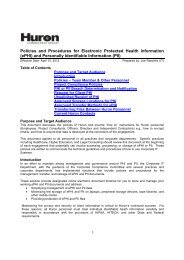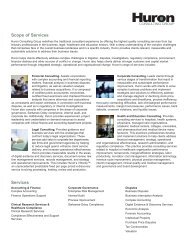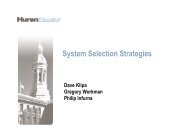What can benchmarking teach us about research administration?
What can benchmarking teach us about research administration?
What can benchmarking teach us about research administration?
Create successful ePaper yourself
Turn your PDF publications into a flip-book with our unique Google optimized e-Paper software.
Get Started on Benchmarking:<br />
<strong>What</strong> <strong>can</strong> <strong>benchmarking</strong> <strong>teach</strong> <strong>us</strong> <strong>about</strong> <strong>research</strong><br />
<strong>administration</strong>?<br />
December 7, 2012
Introduction
Millions ($)<br />
Importance of performance management in<br />
<strong>research</strong> <strong>administration</strong><br />
Funding for <strong>research</strong> has experienced continued decline<br />
25,000<br />
20,000<br />
15,000<br />
10,000<br />
5,000<br />
NIH Extramural Funding<br />
Budget by Year -<br />
Unadj<strong>us</strong>ted<br />
Budget by Year –<br />
Adj<strong>us</strong>ted for Inflation<br />
Budget Fiscal Year<br />
C<br />
B<br />
A<br />
A. Budget sequestration in<br />
2013 is projected to<br />
reduce NIH extramural<br />
funding by as much as<br />
11%<br />
B. Research funding has<br />
not maintained the<br />
pace of biomedical<br />
cost increases.<br />
C. Potential effect will be<br />
30% less <strong>research</strong><br />
buying power over the<br />
last decade<br />
© 2012 Huron Consulting Group. All Rights Reserved. Proprietary & Confidential. 3
Importance of performance management in<br />
<strong>research</strong> <strong>administration</strong><br />
Administrative pressures on <strong>research</strong> are high<br />
A 2009 study by FDP reported that 42% of faculty time spent on<br />
federally-sponsored <strong>research</strong> was actually spent administering<br />
projects (not including proposal writing!)<br />
Lack of funding has created hypercompetitiveness.<br />
Acceptance rates<br />
continue to drop and applications<br />
increase. Added applications equals<br />
added administrative effort<br />
Applications & Acceptance Rates<br />
60,000<br />
40%<br />
50,000<br />
40,000<br />
20%<br />
30,000<br />
20,000<br />
0%<br />
1997 2000 2003 2006 2009 2012<br />
P<strong>us</strong>h for federal reporting requirements has increased, in pursuit of<br />
proven measures of accountability: ARRA, FFATA, DATA Act (proposed),<br />
FCOI<br />
© 2012 Huron Consulting Group. All Rights Reserved. Proprietary & Confidential. 4
Metrics as a performance management tool<br />
Metrics measure and quantify the efficiency, effectiveness, cost and risk of institutional<br />
practices and processes.<br />
The <strong>us</strong>e of metrics <strong>can</strong> assist an institution by:<br />
• Measuring efficiency of current processes and impact of process changes,<br />
• Discovering bottlenecks in existing b<strong>us</strong>iness processes,<br />
• Defining clear and measureable performance goals,<br />
• Serving as the first step to improve performance<br />
© 2011 Huron Consulting Group. All Rights Reserved. Proprietary & Confidential.<br />
5
Why benchmark?<br />
A. J<strong>us</strong>tify current or desired operational levels, e.g. “Is this reasonable?”<br />
B. Identify opportunities to deliver <strong>research</strong> more effectively or efficiently.<br />
“Why are other institutions more successful?”<br />
C. Measure and compare performance against a group of standard<br />
peers as well as aspirational peers – “Can we be the cutting edge?”<br />
B<br />
A<br />
C<br />
© 2012 Huron Consulting Group. All Rights Reserved. Proprietary & Confidential.<br />
6
Benchmarking as a change element<br />
Benchmarking is an important step in the overall improvement process<br />
Set<br />
goals<br />
Gather<br />
data<br />
Benchmark<br />
Interpret<br />
Evaluate<br />
change<br />
Implement<br />
Measure<br />
Compare<br />
Adj<strong>us</strong>t<br />
Benchmarking helps to define the result;<br />
next step is to determine the “how”<br />
© 2011 Huron Consulting Group. All Rights Reserved. Proprietary & Confidential.<br />
7
Today’s disc<strong>us</strong>sion<br />
Benchmarking may be performed across a variety of levels, which have<br />
value based on the operating behavior being measured<br />
Internal Benchmarking<br />
External<br />
Benchmarking
Introduction<br />
Polling question!<br />
<strong>What</strong> metrics does your institution collect?<br />
• Compliance<br />
• Productivity<br />
• Satisfaction<br />
• Error Rates<br />
• Resources<br />
• Salary<br />
© 2011 Huron Consulting Group. All Rights Reserved. Proprietary & Confidential.<br />
9
Institutional Internal Benchmarking
Institutional Internal Benchmarking<br />
Internal vs. External Comparison<br />
Benchmarking is the process of drawing comparison between an institution’s<br />
performance and identified best practice.<br />
Internal <strong>benchmarking</strong> is looking within<br />
an institution to compare performance of<br />
similar areas/departments rather than<br />
looking outward to other institutions for<br />
comparison.<br />
External <strong>benchmarking</strong> is looking outward<br />
to peer institutions or ind<strong>us</strong>try best<br />
practice data to compare performance.<br />
© 2011 Huron Consulting Group. All Rights Reserved. Proprietary & Confidential.<br />
11
Institutional Internal Benchmarking<br />
Benefits to internal <strong>benchmarking</strong><br />
• Internal <strong>benchmarking</strong> much easier to<br />
accomplish than external <strong>benchmarking</strong><br />
• More buy-in from departments on need<br />
for improvement (maximizes apples to<br />
apples comparisons)<br />
• Fosters collaboration and idea-sharing<br />
across departments<br />
• Can reinforce institutional service level<br />
expectations and performance standards<br />
© 2011 Huron Consulting Group. All Rights Reserved. Proprietary & Confidential.<br />
12
Local Administrator Staff FTE<br />
Institutional Internal Benchmarking<br />
Case study—<strong>benchmarking</strong> to improve performance<br />
Huron was asked to assess the performance of the local (departmental) <strong>research</strong><br />
<strong>administration</strong> support function across the medical school of a large <strong>research</strong> institution<br />
and identify opportunities to improve the effectiveness of these units. As part of this<br />
assessment, Huron conducted an internal <strong>benchmarking</strong> initiative where we<br />
quantitatively measured performance across departments <strong>us</strong>ing existing data points.<br />
Local Administration Support Ratio (Expenditures/FTE)<br />
18<br />
16<br />
14<br />
12<br />
10<br />
8<br />
6<br />
4<br />
2<br />
0<br />
$1.1 $1.1<br />
$1.4<br />
$1.6<br />
$1.8<br />
$2.6 $2.6 $2.7<br />
Avg: $3.4M<br />
$3.2<br />
$2.9 $3.0<br />
$3.8 $3.8 $4.0 $4.1<br />
$5.7<br />
$5.9 $6.0<br />
$6.1<br />
$6.3<br />
$7<br />
$6<br />
$5<br />
$4<br />
$3<br />
$2<br />
$1<br />
$0<br />
FY12 Sponsored Program Expenditures/Local<br />
Administrator (Millions)<br />
SP Expense/FTE<br />
LA Headcount<br />
© 2011 Huron Consulting Group. All Rights Reserved. Proprietary & Confidential.<br />
13
Institutional Internal Benchmarking<br />
Using internal <strong>benchmarking</strong> to monitor compliance<br />
• Better understand compliance area at<br />
institution and identify high risk areas<br />
• Monitor specific compliance issues within<br />
departments<br />
• Identify and prevent fraud and waste<br />
• Identify departments/units with overall<br />
high risk profile<br />
• Self-assess/monitor department<br />
performance<br />
© 2011 Huron Consulting Group. All Rights Reserved. Proprietary & Confidential.<br />
14
Institutional Internal Benchmarking<br />
Notable practice—<strong>benchmarking</strong> to improve compliance<br />
A forward-thinking <strong>research</strong><br />
institution is <strong>us</strong>ing data analysis and<br />
internal <strong>benchmarking</strong> to better<br />
understand high-risk areas, monitor<br />
compliance issues within<br />
departments, and determine<br />
departmental risk profiles.<br />
Sample Metrics Used<br />
• Effort reporting (% completion)<br />
• Late salary transfers (# and $ volume)<br />
• Sponsor accounts in overrun stat<strong>us</strong> (# and<br />
$ volume)<br />
• Delinquent financial closeouts<br />
• Expenses past period of performance<br />
• Expired cost sharing accounts with<br />
unexpended balance<br />
• Active cost sharing accounts with low<br />
expenditure rate<br />
• RCR training overdue<br />
• Cost transfer volume (# and volume)<br />
© 2011 Huron Consulting Group. All Rights Reserved. Proprietary & Confidential.<br />
15
Institutional Internal Benchmarking<br />
How to start…<br />
Identify<br />
• Identify top-priority processes/areas to<br />
benchmark<br />
• Organize the benchmark assessment<br />
Collect<br />
• Which data?<br />
• Infrastructure needs<br />
Compare<br />
• Dashboards<br />
• Analytics/reports<br />
Implement<br />
• Identify opportunities, prioritize, change<br />
• Continuo<strong>us</strong> improvement<br />
© 2011 Huron Consulting Group. All Rights Reserved. Proprietary & Confidential.<br />
16
Institutional Internal Benchmarking<br />
Polling question!<br />
Do you conduct internal <strong>benchmarking</strong> at your institution?<br />
• Yes<br />
• No, but we might try<br />
• No, sounds too difficult<br />
• Not sure right now<br />
© 2011 Huron Consulting Group. All Rights Reserved. Proprietary & Confidential.<br />
17
Institutional External Benchmarking
Institutional External Benchmarking<br />
Internal vs. External Comparison<br />
In order to draw a comparison between institutional performance and best practice – an<br />
institution m<strong>us</strong>t first determine what best practice is.<br />
External <strong>benchmarking</strong> <strong>can</strong> be ind<strong>us</strong>try<br />
wide - reaching farther than internal<br />
<strong>benchmarking</strong>.<br />
An outward view of peer institutions’<br />
performance <strong>can</strong> identify ind<strong>us</strong>try best<br />
practice data for comparison.<br />
External <strong>benchmarking</strong> provides broader, ind<strong>us</strong>try-wide<br />
perspective, presenting a unique opportunity for an institution<br />
to measure and target improved performance in <strong>research</strong><br />
<strong>administration</strong>.<br />
© 2011 Huron Consulting Group. All Rights Reserved. Proprietary & Confidential.<br />
19
Institutional External Benchmarking<br />
Benefits to external <strong>benchmarking</strong><br />
There are unique benefits specific to externally <strong>benchmarking</strong> <strong>research</strong> <strong>administration</strong><br />
in higher education.<br />
• Benefits:<br />
• Broader perspective for a reality-based “best<br />
practice”<br />
• Similar comparison basis<br />
Core <strong>research</strong> <strong>administration</strong> processes<br />
Difficulty of sponsored project environment<br />
• Willingness to share the play book<br />
© 2011 Huron Consulting Group. All Rights Reserved. Proprietary & Confidential.<br />
20
Institutional External Benchmarking<br />
Combating the criticisms of external benchmarks<br />
Be prepared to address the common criticisms of external <strong>benchmarking</strong>.<br />
• Criticism:<br />
• Institutional differences<br />
• “We are different”<br />
• “That won’t work for <strong>us</strong><br />
beca<strong>us</strong>e…”<br />
• Approach:<br />
• Maintain foc<strong>us</strong>, keep the driving change mindset<br />
• Communicate the “likeness” of the <strong>research</strong> <strong>administration</strong> environment overall<br />
© 2011 Huron Consulting Group. All Rights Reserved. Proprietary & Confidential.<br />
21
Institutional External Benchmarking<br />
Using external <strong>benchmarking</strong> to attain balanced efficiency<br />
• Recalibrate your institution’s efficiency standards<br />
• Recognize what is possible<br />
• Set goals to achieve increased performance expectations<br />
• Challenge and enable process owners and performers<br />
• Achieve Balance<br />
• Cost-Benefit Considerations<br />
• Average vs. Above Average vs. Top Tier<br />
• Find new solutions for existing problems<br />
• Gain insight into peer institutions to bring fresh ideas to your institution<br />
• Define new performance metrics<br />
• Identify options for innovative supporting organizational structures<br />
© 2011 Huron Consulting Group. All Rights Reserved. Proprietary & Confidential.<br />
22
Institutional External Benchmarking<br />
Case Study: Borrowing “plays” to improve performance<br />
We recently worked with an institution that was foc<strong>us</strong>ed improving the quality and<br />
efficiency of its <strong>research</strong> <strong>administration</strong> infrastructure.<br />
The recommendation to alter the expenditure monitoring process was analyzed to<br />
determine the opportunity balance.<br />
Ease unnecessary and local central burden by eliminating the <strong>us</strong>e of a<br />
formal monthly expenditure review form to be completed by PIs.<br />
We <strong>us</strong>ed qualitative external <strong>benchmarking</strong> to survey peer institution’s alternate<br />
approaches to expenditure review and monitoring.<br />
University Expense Review/Approval Process Summary Central Audit?<br />
A<br />
B<br />
C<br />
D<br />
- Central post-award office requires physical reviews of selected expense categories at set threshold levels.<br />
- All other expenses are submitted by the PI, via the financial system, with the PI held accountable for accuracy.<br />
No<br />
- Central <strong>administration</strong> engages in periodic audit samples to ensure compliance.<br />
- Department administrators and Pis are held accountable for grant expenditures.<br />
Yes<br />
- Department administrators run financial reports to review with the PI for accurancy.<br />
- Central post-award adminsitration reviews selected purchases over a set dollar threshold and all non-salary cost<br />
transfers. - Central post-award performs a prospective review of most grant expenditures in addition to a monthly<br />
expenditure review.<br />
Yes<br />
Yes<br />
© 2011 Huron Consulting Group. All Rights Reserved. Proprietary & Confidential.<br />
23
Institutional External Benchmarking<br />
The steps and challenges to getting started….<br />
Identify<br />
• Identify top-priority processes/areas to benchmark<br />
• Organize the benchmark assessment<br />
Collect<br />
• Identify peer institutions to target – current peers and aspirational peers<br />
• Quantitative data<br />
• Qualitative data<br />
Compare<br />
• Develop dashboards and reports<br />
• Adj<strong>us</strong>t for external factors<br />
Implement<br />
• Identify opportunities<br />
• Balance the opportunity to prioritize change<br />
• Continuo<strong>us</strong> improvement<br />
© 2011 Huron Consulting Group. All Rights Reserved. Proprietary & Confidential.<br />
24
Institutional External Benchmarking<br />
Third party data sources<br />
Institutions <strong>can</strong> address<br />
some of these challenges by<br />
leveraging third party data<br />
sources.<br />
These third parties take on<br />
some of the work for the<br />
Identification, Collection<br />
and Comparison steps.<br />
Third Party Benchmark Data Sources<br />
•COFHE: Consortium on Financing Higher Education<br />
(31 institutions)<br />
•IPEDS: Integrated Post Secondary Education Data<br />
System (Tho<strong>us</strong>ands of schools)<br />
•Regional/athletic conference university networks:<br />
e.g., Coalition of Urban Serving Universities<br />
•PRIM&R: IACUC/IRB performance metrics<br />
•EduCa<strong>us</strong>e: University IT<br />
•CUPA HR: Human Resources Spending and Staffing,<br />
Benefits<br />
•Small Niche Cooperatives or professional<br />
organizations measure data within specific functional<br />
areas (e.g. NCURA)<br />
•IACUC Handbook: Published survey results and<br />
overall guidance (J. Silverman)<br />
© 2011 Huron Consulting Group. All Rights Reserved. Proprietary & Confidential.<br />
25
Institutional External Benchmarking<br />
RADIUS Benchmarking Survey<br />
In cooperation with several tr<strong>us</strong>ted and prominent ind<strong>us</strong>try partners,<br />
Huron Education is pleased to offer the RADIUS Benchmarking Survey, a<br />
comprehensive, education and <strong>research</strong> <strong>benchmarking</strong> source.<br />
The survey foc<strong>us</strong>es on spending, staffing and performance efficiency<br />
across several survey modules:<br />
• Sponsored Projects and Research Administration<br />
• Budgeting<br />
• Enrollment Management<br />
• Human Resources<br />
• Information Technology<br />
• Facilities<br />
• Library<br />
• Procurement<br />
© 2011 Huron Consulting Group. All Rights Reserved. Proprietary & Confidential.<br />
26
Institutional External Benchmarking<br />
RADIUS Benchmarking Survey<br />
• All participating institutions of the RADIUS Initiative will receive a<br />
detailed, c<strong>us</strong>tomized report that includes:<br />
• An executive summary of ind<strong>us</strong>try-wide results, based on econometric modeling<br />
and analysis, that identifies emerging trends across peer groups<br />
• A c<strong>us</strong>tomized <strong>benchmarking</strong> report comparing your institutional data against<br />
relevant peer groups<br />
• An extensive appendix of data tables showing quartiles and averages for vario<strong>us</strong><br />
metrics<br />
• The option for a follow-up conversation with Huron Education’s ind<strong>us</strong>try and<br />
process experts<br />
• Altogether, the report highlights foc<strong>us</strong>ed approaches to improve the b<strong>us</strong>iness<br />
performance of their administrative functions.<br />
© 2011 Huron Consulting Group. All Rights Reserved. Proprietary & Confidential.<br />
27
Institutional External Benchmarking<br />
Polling question!<br />
• The Sponsored Projects Administration component of RADIUS<br />
surveys the following topical areas. Which one are you most<br />
interested in?<br />
• Organization and Staffing<br />
• Training<br />
• Pre-Award Processes<br />
• Post-Award Processes<br />
• Technology Systems<br />
© 2011 Huron Consulting Group. All Rights Reserved. Proprietary & Confidential.<br />
28
Institutional External Benchmarking<br />
RADIUS Benchmarking Survey<br />
The RADIUS Benchmarking Survey is only available online. If you are<br />
interested in taking the survey, please visit <strong>us</strong> online at<br />
https://huron<strong>benchmarking</strong>survey.huronconsultinggroup.com/<br />
or email RADIUS@huronconsultinggroup.com directly for more<br />
information.<br />
© 2011 Huron Consulting Group. All Rights Reserved. Proprietary & Confidential.<br />
29



